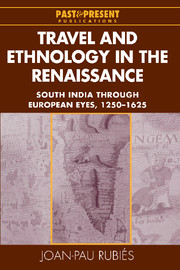Book contents
- Frontmatter
- Contents
- List of illustrations
- Preface
- Acknowledgements
- A note on spelling and vocabulary
- 1 In Search of India: the empire of Vijayanagara through European eyes
- 2 Marco Polo's India and the Latin Christian tradition
- 3 Establishing lay science: the merchant and the humanist
- 4 Ludovico de Varthema: the curious traveller at the time of Vasco da Gama and Columbus
- 5 The Portuguese and Vijayanagara: politics, religion and classication
- 6 The practice of ethnography: Indian customs and castes
- 7 The social and political order: Vijayanagara decoded
- 8 The historical dimension: from native traditions to European orientalism
- 9 The missionary discovery of South Indian religion: opening the doors of idolatry
- 10 From humanism to scepticism: the independent traveller in the seventeenth century
- Conclusion: Before Orientalism
- Appendix
- Bibliography
- Index
- Past and Present Publications
Preface
Published online by Cambridge University Press: 29 October 2009
- Frontmatter
- Contents
- List of illustrations
- Preface
- Acknowledgements
- A note on spelling and vocabulary
- 1 In Search of India: the empire of Vijayanagara through European eyes
- 2 Marco Polo's India and the Latin Christian tradition
- 3 Establishing lay science: the merchant and the humanist
- 4 Ludovico de Varthema: the curious traveller at the time of Vasco da Gama and Columbus
- 5 The Portuguese and Vijayanagara: politics, religion and classication
- 6 The practice of ethnography: Indian customs and castes
- 7 The social and political order: Vijayanagara decoded
- 8 The historical dimension: from native traditions to European orientalism
- 9 The missionary discovery of South Indian religion: opening the doors of idolatry
- 10 From humanism to scepticism: the independent traveller in the seventeenth century
- Conclusion: Before Orientalism
- Appendix
- Bibliography
- Index
- Past and Present Publications
Summary
Southern India, especially the Malabar coast and the kingdom of Vijayanagara, received many European visitors during the transition from the Middle Ages to modern times. Their travel narratives and chronicles provide a unique insight into the encounter between Europeans and a non-Christian, non-Muslim civilization, which they neither wished to ignore nor were able to dominate. In effect, this is less a book about southern India and its visitors than a book about the European Renaissance from a new perspective, emphasizing the growth of an analytical discourse about human diversity. The choice of Vijayanagara as a case-study is designed to help develop a carefully contextualized argument about the evolution of European travel literature and its intellectual content, which not only seeks to identify changes, but also aims to explain their logic. This book contends that the logic of this cultural change was driven by interactions (and often misunderstandings) with other cultures, rather than by a mere projection of European aims and ideologies. In other words, contacts with non-Europeans were intrinsically important, rather than just rhetorically important, for the development of European culture. The powerful cultural transformation of the Latin Christian world from the thirteenth to the seventeenth centuries was therefore not simply the origin of a new western way of looking and dominating: it was also a genuine, if often twisted, response to the challenge of cultural differences experienced abroad and re-evaluated in Europe.
- Type
- Chapter
- Information
- Travel and Ethnology in the RenaissanceSouth India through European Eyes, 1250–1625, pp. x - xixPublisher: Cambridge University PressPrint publication year: 2000

